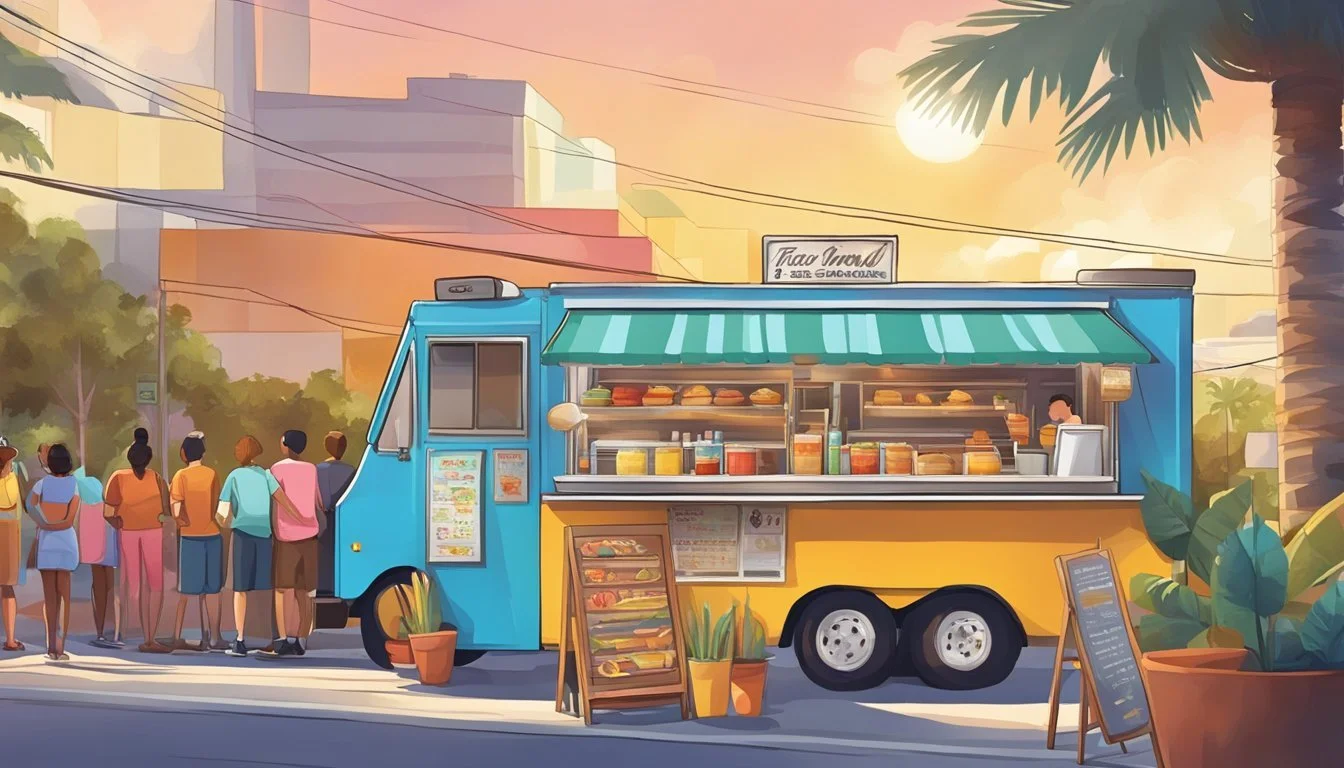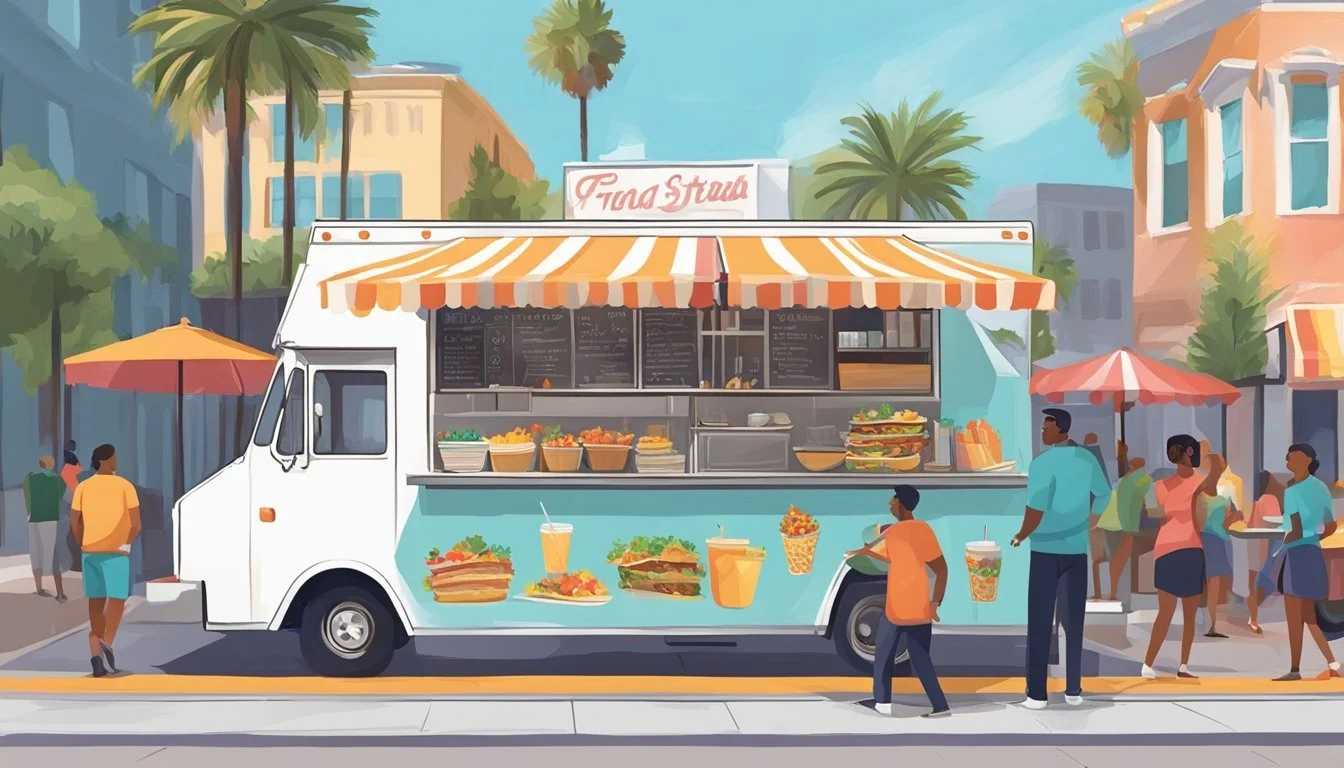Food Truck Laws Orlando, Florida
A Guide to Regulatory Compliance
In the vibrant cityscape of Orlando, Florida, food trucks have become an integral component of the urban dining experience, offering an array of culinary delights to locals and tourists alike. The city has implemented regulations to manage this dynamic industry, promoting a thriving street food culture while ensuring safety and fairness in operation. Those interested in venturing into the mobile food vending business in Orlando must navigate through a specific set of legal requirements, starting with the application process, which is tailored to maintain the city's standards for public health and business conduct.
Obtaining a license is mandatory for food truck operators in Orlando, where the city's rules are distinct from those of Orange County. Potential vendors must comply with the Mobile Food Vending Pilot Program, which establishes designated areas and parking spaces for food trucks and carts, particularly to accommodate the lunch crowd and evening patrons around nightlife hubs. These regulations are designed to facilitate the growth of 'foodpreneurs' and integrate mobile food vending into the city's economic and social fabric.
Coherent with the city's commitment to its food scene, the proposed amendments aim to encode the established regulations within the Land Development Code, thereby streamlining the process and providing a clear structure for current and future mobile food vendors. The evolving framework underscores Orlando's support for innovation in the food industry while balancing the interests of stationary businesses, pedestrian traffic, and neighborhood aesthetics.
Starting Your Food Truck Business
Starting a food truck business in Orlando, Florida, involves careful planning and adherence to the city's specific regulations. Entrepreneurs must focus on creating a comprehensive business plan, choosing the right equipment, securing finances, and understanding local laws regarding zoning and permitted locations.
Developing Your Business Plan
A detailed business plan is the foundation of a successful food truck venture. This should outline the food truck business structure, whether operating as a sole proprietorship or a partnership, including your business name, menu concept, and strategies for growth. Additionally, the plan must include startup costs and projected financials.
Selecting Your Food Truck and Equipment
Choosing the appropriate vehicle for your mobile food enterprise is critical. Food trucks in Orlando need to be equipped with the necessary food preparation and storage facilities. Complying with the City of Orlando's health and safety standards means selecting high-quality equipment for your commissary.
Securing Financing and Insurance
Acquiring sufficient financing is essential for covering your startup costs, which include the food truck, equipment, and initial inventory. Additionally, comprehensive insurance coverage is mandatory to protect your business against potential liabilities.
Understanding Zoning and Location Restrictions
Orlando has specific zoning laws that affect where mobile food vendors can operate. You must understand the restrictions for operating on private property versus public spaces. Acquaint yourself with the permits and fees related to sales tax and other regulatory requirements as detailed in the Mobile Food Vending Pilot Program.
Legal and Regulatory Requirements
Running a food truck in Orlando, Florida, involves navigating through various legal and regulatory requirements. These regulations ensure public safety, fair business practices, and compliance with state laws.
Licensing and Permits
Mobile Food Vendors, including food trucks and food carts, must obtain a Business License and a Mobile Food Vendor Permit through the City of Orlando. The initial step involves the Planning Division granting an Approval for location and operations. Vendors should also acquire specialized permits if they sell certain types of food.
Health and Safety Regulations
The Florida Department of Health conducts inspections, ensuring all mobile food vendors comply with food safety regulations. Food trucks are to maintain high sanitation standards, similar to static food establishments. Inspections focus on equipment, food handling, and overall cleanliness. Additionally, vendors must receive food safety training and certification.
Taxation and Employer Obligations
Food trucks must register with the IRS to obtain an Employer Identification Number (EIN). This number is essential for tax purposes and for hiring employees. The Florida Department of Revenue requires mobile food vendors to collect and remit sales tax, in accordance with state regulations.
Compliance with Florida Statutes
The businesses must adhere to the Florida Statutes and the rules set by the Florida Department of Agriculture and Consumer Services. The statutes outline specific requirements for operational aspects of mobile food establishments, including the types of food that can be served and the conditions under which they are stored and prepared.
Operational Guidelines for Food Trucks
In Orlando, Florida, several specific regulations govern the operation of food trucks, ranging from food handling and partnership agreements with commissaries to zoning laws and permitted operational hours. These regulations help ensure the safety and organization of mobile food services throughout the city.
Food Menu and Service Operations
Food trucks in Orlando are required to adhere to strict food safety regulations to ensure public health. They must obtain food safety permits and comply with the Florida Department of Business and Professional Regulation's standards. A diverse menu offering culinary delights is key to attracting customers, but food trucks must not process or prepare exposed potentially hazardous foods without the proper permits.
Vendor Relationships and Commissaries
Maintaining a good partnership with a commissary is vital for food trucks, as it is where they often replenish supplies, prepare and store food. All food trucks must have a Commissary Letter of Agreement to document the relationship. This agreement is part of what the city might review when issuing permits for food truck operations.
Usage of Public and Private Spaces
The city of Orlando delineates where food trucks can operate. Zoning laws allow them to do business in designated areas on private property and certain public spaces. However, food trucks must have the property owner's permission to operate on private land and adhere to the city's guidelines for public locations, which includes specified hours of operation.
Participation in Events and Markets
Orlando encourages food trucks to participate in city-approved events, which could include a farmer’s market or a flea market. For such events, food trucks often have to obtain an event permit, and they must abide by event-specific regulations. This includes limited operational hours and designated spots allocated for vending during these events, all in the interest of maintaining safety and order.
Marketing and Customer Engagement
In Orlando, the success of a food truck business hinges on strong brand identity and customer relationships. Effective marketing strategies are essential, including the utilization of social media for brand building and the implementation of customer service tactics to retain a loyal customer base.
Brand Building and Social Media
A food truck's brand is its signature, involving both the business name and the menu. Crafting a unique and memorable business name is critical for food truck owners because it acts as the cornerstone of the brand. Similarly, the menu should reflect the uniqueness of the brand, offering distinctive and appealing items that stand out in Orlando's competitive foodie scene. It's essential for food trucks to leverage social media platforms to create a visual and interactive narrative around their brand. Instagram, with its focus on imagery, is particularly powerful for showcasing mouth-watering dishes and the vibrant street food atmosphere.
Customer Service and Retention Strategies
Customer service must be a top priority for any food truck business to encourage repeat patronage. Personalized service, prompt response to feedback, and creating a positive experience can turn a one-time visitor into a regular. Focusing on customer loyalty programs, such as punch cards or digital reward systems, is an excellent way for food trucks to retain customers. Additionally, engaging directly with customers at the truck and through online interactions can foster a sense of community, making patrons feel valued and connected to the food truck brand.
Expansion and Scaling Your Business
When scaling a food truck business in Orlando, Florida, it is essential to consider both diversifying revenue streams and building strategic partnerships to facilitate growth. These elements are crucial in the evolution from a single mobile business to a potentially larger enterprise.
Exploring Additional Revenue Streams
Expanding beyond the traditional food truck model can substantially increase profitability. Mobile Retail Vendors may explore Non-Food Merchandise sales, tapping into the demand for on-the-go consumer goods. Additionally, participation in Maker's Markets can introduce the brand to new customer segments. These venues often encourage innovation, allowing for creative expressions of the brand beyond food.
Licensing arrangements can also provide additional income. Securing a Business License for branded products allows food trucks to sell their goods in various retail environments. This can include pre-packaged versions of their menu items or complementary culinary products, scaling their reach without the constraints of location.
Leveraging Business Platforms and Partnerships
Strategic partnerships can streamline operations and increase exposure. Aligning with local businesses and event coordinators can secure prime vending locations, while collaborations with delivery services expand reach to customers who prefer dining at their Small Home Office or central place of work. Establishing a network through a Central Office that can manage these partnerships is vital for consistent service and reputation management.
Engaging with business platforms can optimize the food truck's operations and marketing. Digital platforms not only aid in day-to-day truck logistics and point-of-sale transactions but also play a significant role in scaling the brand's presence both online and offline. This approach leverages technology as a force multiplier, enhancing growth potential without incurring excessive overhead.
By exploring various revenue streams and leveraging partnerships, food trucks in Orlando can strategically expand their operations, innovate their offerings, and solidify their presence in the mobile business landscape.
Resources and Support
In Orlando, Florida, food truck operators have access to specific resources and support systems designed to facilitate their business operations. These include points of contact within regulatory agencies and online platforms that offer vital information and forms.
Contacting Authorities and Support Organizations
The City of Orlando's Planning Division provides valuable assistance for food truck entrepreneurs navigating the planning application process. Businesses can contact them at the main office located at 400 South Orange Avenue, Orlando, FL 32801. This office aids with understanding city regulations and acquiring necessary permits for mobile food vending.
The Florida Department of Agriculture and Consumer Services plays a crucial role in enforcing food safety regulations applicable to mobile food establishments. Food truck vendors should familiarize themselves with the guidelines available through their online platform, and reach out for specific requirements related to their operations.
For statewide business regulations, the Florida Department of Business and Professional Regulation provides oversight on the licensure of food service entities. They make their contact information available for inquiries and offer detailed advice on compliance matters.
Those seeking to form an official business entity such as Limited Liability Companies (LLCs) or Limited Partnerships can get guidance and file necessary documents with Florida's Division of Corporations. This entity manages the administrative side of business registrations in the state.
Utilizing Online Tools and Information
Operators can leverage City of Orlando's official website to find a comprehensive Mobile Business Guide. This guide includes checklists and requirements for mobile vendors and is a thorough resource for navigating city-specific vending rules.
Furthermore, detailed permitting information, forms, and regulations can be found on the Florida Department of Agriculture and Consumer Services website. This site hosts a PDF outlining mobile food permit requirements, greatly simplifying the application process for newcomers.
Finally, prospective and current food truck owners should ensure their business's statutory compliance by checking in with the Florida Division of Corporations. This online resource allows them to manage filings for Limited Liability Companies and Limited Partnerships, maintaining their operational legality.




